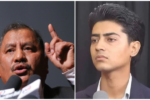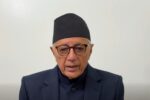TORONTO: Justin Trudeau has won a second term as Canada’s prime minister after the country’s federal election, but his narrow victory means he will lead a minority government that will be forced to depend on other parties to govern.
The Liberals were leading or victorious in 146 out of 304 electoral districts that had reported results by about 10:30 pm Toronto time on Monday, according to the national broadcaster CBC. Trudeau needed to win 170 seats to secure a second majority government.
Conservative leader Andrew Scheer was unable to generate enough enthusiasm among voters to win the seats required to form the government.
The Conservatives’ pledge to repeal the country’s carbon tax failed to resonate with voters in the electorally-important suburbs of Ontario and Quebec.
US President Donald Trump, who has had an often tense relationship with Trudeau, tweeted: “Congratulations to @JustinTrudeau on a wonderful and hard-fought victory. Canada is well served. I look forward to working with you toward the betterment of both of our countries!”
The polls in the final days of the campaign, suggesting a narrow victory for the Liberals, turned out to be accurate.
The Bloc Québécois, a party devoted to Quebec nationalism, picked up a substantial number of seats in that province, denying the Liberal Party the seats required to form government in its own right.
The Liberals are forecast to win 157 seats, down from 184 in the past election and just short of the 170 needed to win a parliamentary majority.
The Conservatives are expected to win 122 seats, the Bloc Québécois 32 seats and the left-wing New Democrats 23 seats.
The Green Party won three seats.
The popular vote was evenly split between the main parties with the Conservatives on 34 percent, the Liberals on 33 percent and the New Democrats on 15 percent.
After winning power four years ago, Trudeau created a gender-balanced cabinet and legalized assisted dying and recreational marijuana.
The economy has performed strongly since his 2015 victory, with unemployment at 5.5 percent.
But Trudeau has recently been dogged by scandals, especially the so-called SNC-Lavalin affair.
In August the Canadian Parliament’s ethics commissioner found that Trudeau improperly influenced the then minister of justice and attorney-general to intervene in a criminal case against SNC-Lavalin, a Quebec-based construction company.
The affair led to the downfall of two cabinet ministers and Trudeau’s top advisor.
Earlier this year Trudeau’s approval ratings sunk to 28 percent, significantly lower than Trump’s.
“He can’t even remember how many times he put blackface on because the fact of the matter is he’s always wearing a mask,” Scheer said during a campaign leaders debate.
The Conservatives tried to capitalize on Trudeau’s unpopularity but failed to expand support beyond their base in western Canada.
Speaking to supporters on Monday night, Bloc Québécois leader Yves-François Blanchet ruled out forming a coalition government with either major party.
But he said his party would work together on policies that improve life for Quebec’s residents.
“This is a parliament we will have to make work,” he said.
(Agencies)









Comment